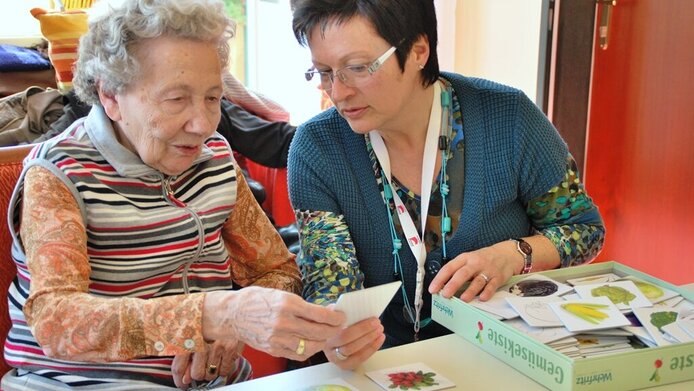Optimised long-term care for persons with dementia

Life expectancy is rising – as is the need for professional long-term care. The care services currently being provided barely meet the existing demand. Therefore, the available resources need to be adapted intelligently. This is the only way, affordable services of sufficient quality can continue to be provided in the future. In-depth and critical analyses are needed as an evidence base for the required adaptation of the existing system, and very few of these are currently available on institutional long-term care in Europe. As part of a project that is being carried out at Danube University Krems in cooperation with in cooperation with the Charles University in Prague and MAS Alzheimerhilfe, a patient/carer organization in Upper Austria, epidemiological data on the care situation in Austria and the Czech Republic are now being collected for the first time. The Project is being funded by the Austrian Science Fund FWF and the GACR in the Czech Republic – FWF being the lead agency – and focuses on the situation of persons with dementia who require particularly intensive support.
Care data through careful data collection
The project leader, Stefanie Auer from the Centre for Dementia Studies at Danube University Krems in Austria, describes the project as follows: "At the heart of long-term care we have those in need of care of course, but this is paradoxically scientific terra incognita. Far too little is known about the cognitive capacities, about the behavioural patterns and the general health situation of persons living in nursing homes. So how can the offered care services be adapted while maintaining the necessary quality?" Auer and her Czech research partners Iva Holmerova and Hanka Vankova will now collect these missing data at six randomly selected nursing homes in Austria and the Czech Republic. A total of about 1,000 care recipients will be surveyed; their data will be processed and analysed using a common data base.
Data dimensions
Three other areas that also have a crucial impact on the care situation are also being examined: the care teams in the nursing homes and their workloads and burden, the needs of relatives of the care recipients, and environmental details in the nursing homes. Stefanie Auer cites an example which illustrates the importance of such multi-dimensional data surveying: "Practical experience shows that persons with dementia in nursing homes frequently suffer from depression, are often restless and wander around aimlessly. These behavioural problems represent an enormous burden for the person herself, for other residents, the care teams and the relatives. Although there are indications that such behaviour is influenced by environmental factors and education, we know very little about the precise correlations at work here." Stefanie Auer and her colleagues hope to identify these important but hitherto largely unknown factors in this basic research project, which affect the overall care situation, and in this way gain a better understanding of them.
One study – two perspectives
Another aspect of the study, which is attracting international interest, arises from the objective of providing a comprehensive picture of the care situation. Expert knowledge from two disciplines provides the basis for a common study protocol: assessment methods from both medicine and psychology are being used, thereby enabling the recording of large volumes of data. This, in turn, enables a comprehensive statistical evaluation and, ultimately, the creation of better evidence bases. The fact that the nursing homes randomly selected for the study operate in the three available care provision sectors (state, church and private sector) also contributes to the comprehensive nature of the research. This ensures that the study will be providing representative data for the actual care situation in the two countries.
General good
The basic validity of the study protocols to be developed in the context of the study is very important for Stefanie Auer. The challenges facing the care system as a result of population development are similar across Europe, and basic insights – the type that will be generated by this FWF project – will provide a significant contribution to meeting these challenges.
Personal details Stefanie Auer is a researcher at the Department for Clinical Neurosciences and Preventive Medicine at Danube University Krems/Austria. She is the Director of the Centre for Dementia Studies and Scientific Director of MAS Alzheimerhilfe a patient/carer organisation in Austria. She is particularly interested in non-pharmacologic therapies for persons with dementia and in the development of innovative care models for rural regions. She previously carried out research at universities in Germany and the USA.
Publications
Professional care team burden (PCTB) scale- reliability, validity and factor analysis. Auer, S, Gräßel E, Viereckl C, Kienberger U, Span E, Luttenberger K. biomedcentral open access 2015. Health and Quality of Life Outcomes (2015) 13:17 doi: 10.1186/s12955-014-0199.
Dementia service centres in Austria: A comprehensive support and early detection model for persons with dementia and their caregivers-theoretical foundations and model description. Auer, S. Span E. Reisberg B. Dementia (London). 2015 Jul;14(4):513 – 27. doi: 10.1177/1471301213502214.
Further information on the project






